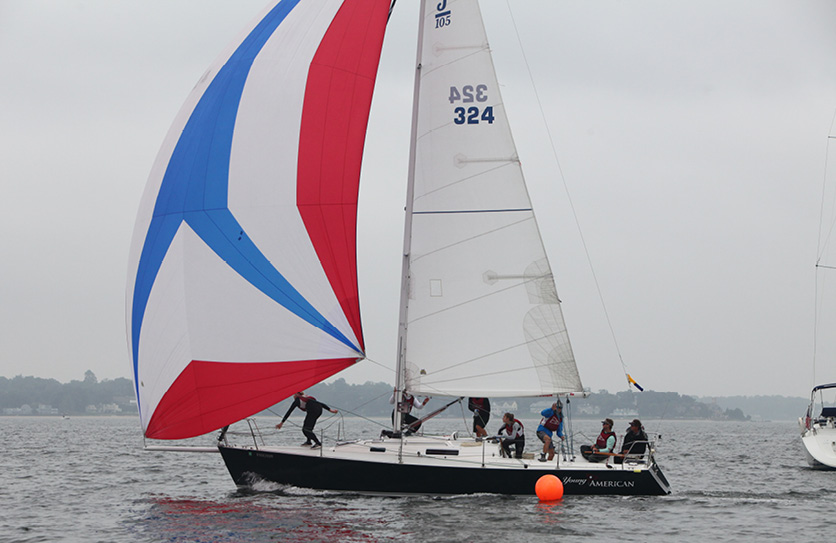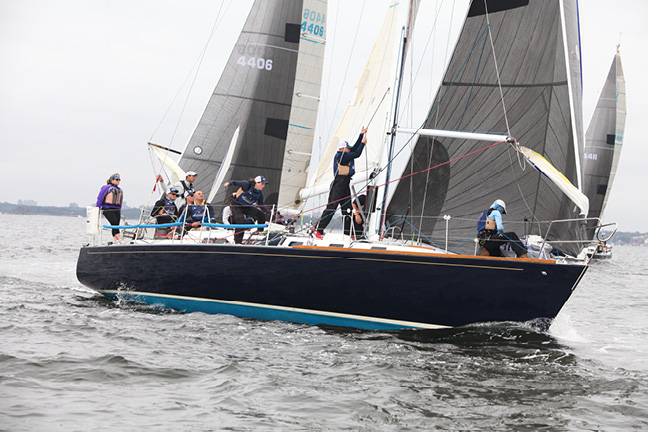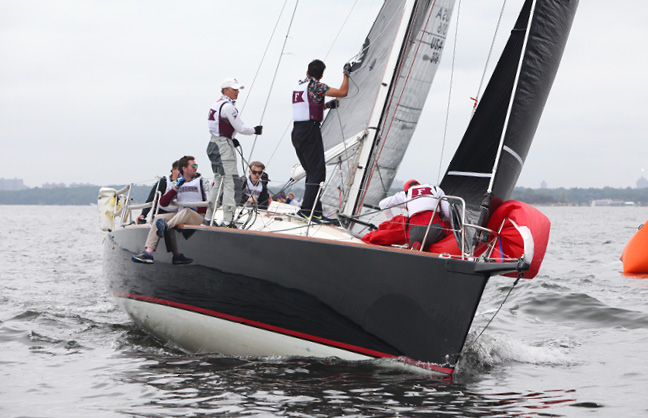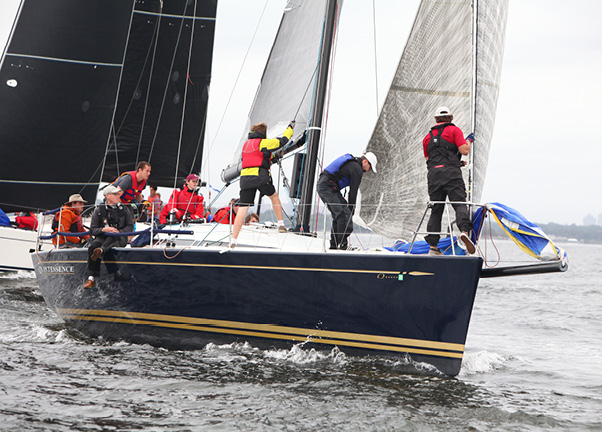By Ron Weiss
The Storm Trysail Foundation’s 2018 Intercollegiate Offshore Regatta (IOR) enjoyed reasonably good sailing conditions on October 6 & 7. Conditions were gray and misty but with winds that, albeit shifty, were generally 6 to 10 knots for the five-race series, which was hosted by Larchmont Yacht Club in Larchmont, NY. Sailing a variety of keelboats generously loaned to the event, 47 teams duked it out on Long Island Sound.

The College of Charleston team dominated the 12-boat J/105 class with a perfect 1-1-1-1-1 scoreline. © Howie McMichael
“The wind was solid enough that the racing was close in almost every race, but it wasn’t blowing so hard that the less experienced teams had too much difficulty,” observed Deputy Race Officer Ray Redniss. “Most of the starts were very competitive, especially considering that we have many teams that are primarily dinghy squads which have to learn the physics of big offshore boats, which are very different to say the least.”
College of Charleston (South Carolina) took home the Paul Hoffmann Trophy as the overall winner, and was presented the trophy by Paul “Binky” Hoffmann, Jr., son of the longtime Storm Trysail Club (STC) member for whom the trophy is named. Charleston’s team was mostly new to the event and sailing Young American, owned by the Young American Sailing Academy (YASA) in the J/105 class, the biggest class in the fleet.

The U.S. Naval Academy is the first winner of the James D. Bishop Trophy. Jim would be proud. © Howie McMichael
“Coming here to Long Island Sound, you have to look for the pressure,” explained Charleston co-captain William Hundall. “Our team takes detailed notes every year, and we pass that down to the next year’s group. Sometimes though, during hurricane season, just getting here from Charleston can be an adventure by itself! It’s a real team sport, and very much a mental game, staying focused when things are going awry.”
All but one of the Charleston team have sailed together with YASA on Gambler in the Newport Bermuda Race, the Ida Lewis Distance Race, and the Vineyard Race, but only one, Key Becker (son of YASA co-founder Peter Becker) had ever sailed on a J/105 before. Peter accepted the Ed du Moulin Trophy, which goes to the owner of the boat that wins the Hoffmann Trophy.
The trophy was presented by Ed’s son, STC member Rich du Moulin.
The J/44 class is traditionally sailed by service academy teams in the IOR. This year’s class winner, the United States Naval Academy, was awarded the James D. Bishop Trophy, named after the longtime STC member and supporter of the J/44 class who passed away earlier this year. Navy raced Maxine, owned by STC member Bill Ketcham.
Team captain George Davis – a Junior majoring in Naval Architecture and Marine Engineering who plans on being in the reactor room on an aircraft carrier after graduation – talked about how the experience of offshore sailing applies to being in the Navy. “Our squad came in with a lot of high-powered experience from racing our TP 52 Hooligan and our Ker 50 Wahoo (ex-Snow Lion, donated to the Academy by STC member Lawrence Huntington). The Academy teaches “Small Unit Leadership” and races like these and the offshore races like Newport Bermuda give us real world training that is like life in the Navy; the leadership lessons are not just sailing-specific.”

The Fordham Rams sailed Tenebrae to victory in PHRF 2. © Howie McMichael
The team from Michigan Tech gave the owner of the Swan 42 Quintessence – STC member Roger Widmann – a 79th birthday present with a win in PHRF Class 1. Co-captain Nick Irwin has done the IOR three times before. “This is the first time we’ve won but we got third twice before this,” said Irwin. “The crew was outstanding; great teamwork. Several of our crew were dinghy sailors and the big surprise for them is how powerful these boats are and how fast they can go. The dinghy sailors usually try to pull lines by hand, but realize pretty quickly you just can’t do that.”
Michigan Tech tactician Gabrielle Gentz concurred. “There are so many working parts, a million lines and things to handle. For dinghy sailors, it’s a baptism by fire. I’ve been racing my own Ensign in a one-design fleet in Harbor Springs for four years. It’s a small boat, but it’s like a small big-boat and that helped me a lot.”
Fordham University earned their first-ever IOR victory, taking first in PHRF Class 2 on the J/124 Tenebrae. “I sail on Tenebrae fairly often, which is advantageous,” said captain Frank Loughran. “I’m the bowman, but the rest of the team were all new to the boat with absolutely no real offshore experience. I know the boat and three other sailors have decent big boat experience, but the rest were all dinghy sailors.”
“This was my first time actually seriously racing on a big boat,” said Fordham pitman Scott McKenzie. “It was a little hectic at first and the expectations were high, but after some practice everyone got the hang of their role. Teamwork is very definitely different from dinghies because you all have separate roles. Knowing your job and where you fit in with the others is critical.”
The Tufts Jumbos won a tough J/109 class on Freedom. Captain Bo Eaves is the son of the boat’s owner, Corey Eaves. This was his first time competing, but in an unusual set of circumstances, Bo had done the IOR once before as the Owner’s Representative. This year, he was both a competitor and the Owner’s Rep. “That was kind of an interesting thing,” said Eaves. “We had to focus on connecting the dots upwind, sailing from pressure to pressure. Not tacking on every little shift but staying in the breeze was really important. We also had to do a lot of teaching [to less experienced crew members] while we were racing, which is hard.”
Villanova, racing STC member Iris Vogel’s J/88 Deviation, took the top spot in PHRF 2. “We are a fairly inexperienced team,” explained team captain Harrison Paige. “We held a lot of chalk talks, practiced hard and really developed ourselves as a club team – we have one club team for both dinghies and big-boat sailing. Big boat sailing is kind of daunting at first, but once you get past the initial scariness you realize it’s just a big dinghy and all the things you learn about dinghies – weight placement, sail trim, etc. – still apply. And once you put the focus and energy into it, the performance comes out.”

Michigan Tech prevailed in PHRF 1. © Howie McMichael
Butch Ulmer, the IOR Chair and Principal Race Officer, was enthusiastic about this year’s regatta. “This event is a lot of work, especially because we have to find owners who are willing to loan their boats to college teams,” he said. “That’s always a big challenge, and I’d like to thank each of the owners for their generosity and their time. I hope that next year we can expand the event even more; the limiting factor is not the number of colleges that are interested, it’s not having additional boats. So if you own a boat, or know someone who might be interested, please let us know if you’d like the support the event next year. I also have to thank the innumerable volunteers, both on and off the race course who help make this the world-class event that it is.”
You’ll find more information at stormtrysailfoundation.org/intercollegiate-regatta, including a link to complete results at YachtScoring.com.
Ron Weiss is the Chair of the Storm Trysail Club’s Sponsorship and Communications Committee.




